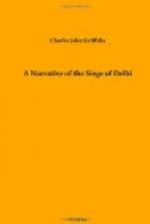Many of the officers lamented the hard fate which had doomed them to service in the East, while the more fortunate regiments had been earning fame and quick promotion in the Crimea and in the recent Persian campaign. We little thought of what was in store for us, or of the volcano which was smouldering under our feet.
The signs of incipient mutiny in the native army had been confined, up to this time, to the Presidency of Bengal and to the regiments quartered there. With us at Ferozepore there was little, if any, indication of the coming outbreak. True it was that some of us noticed sullen looks and strange demeanour among the sepoys of the two battalions. They, on occasions, passed our officers without the customary salute, and, if my memory serves, a complaint of this want of respect was forwarded to their Colonels. Our billiard-marker, too, a high-caste Brahmin who had served on our side in the Afghan campaigns of 1839-42 in the capacity of a spy, a man of cunning and intelligence, warned us in unmistakable terms of the increasing disaffection among the sepoys of Ferozepore, and stated his opinion that the spirit of mutiny was rife among them. We laughed at his fears, and dismissed from our minds all alarm, vaunting our superiority in arms to the dusky soldiery of Hindostan, and in our hearts foolishly regarding them with lordly contempt.
Thus passed in the usual quiet the first twelve days of the month of May, 1857. The morning of May 13 saw us, as usual, on parade; then, adjourning to the mess-house, we spent a few hours over breakfast and billiards, and before midday separated to pass the heat of the day reading, lounging, and sleeping at our respective bungalows.
I occupied a large house some distance from the mess in company with a field-officer and the Adjutant of my regiment. The former, about 1 p. m., was summoned by an orderly to attend a meeting at the quarters of the Brigadier[1] commanding the troops at Ferozepore. We paid no heed to this incident, as it occurred to us that the Major’s advice and opinion were required on some matter of regimental or other routine.
Vicars and I were in the habit, since the hot weather began, of making ices every afternoon, and had become, from long practice, quite proficient at the work. At three o’clock we were in the midst of our occupation, our whole thoughts and energies bent on the accomplishment of our task. Clad in loose deshabille, seated on the floor of the sitting-room, we worked and watched the process of congelation.
Presently a quick step was heard in the hall, the door was thrown open, and the Major, rushing in, sank breathless into a chair. The Adjutant and I jumped up, and in our haste upset the utensils, spilling on the floor the contents we had taken so much trouble to prepare. A minute or two passed, and still no word from our friend, who, portly in shape, and of a plethoric temperament, seemed overcome by some terrible excitement, and fairly gasped for breath.




